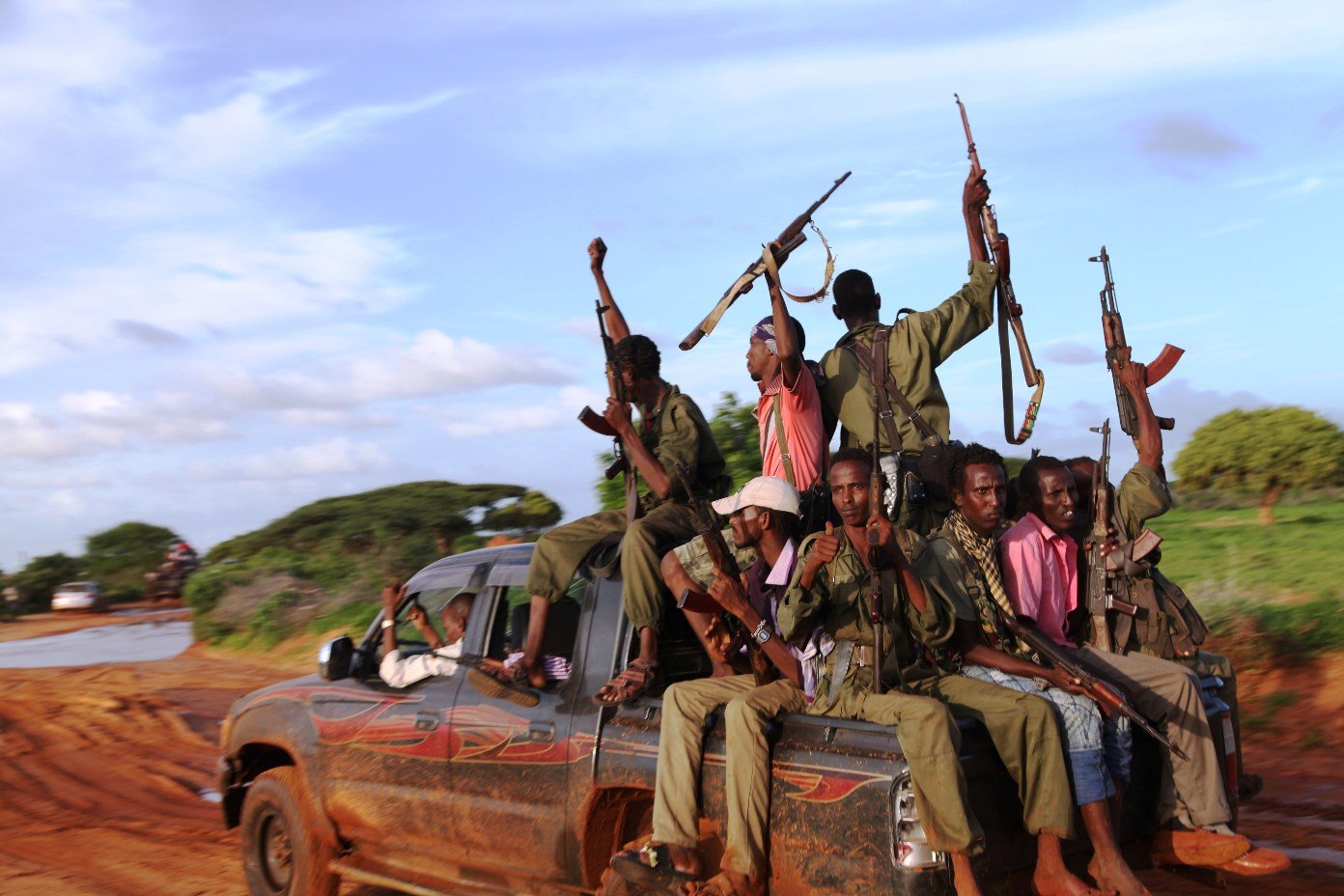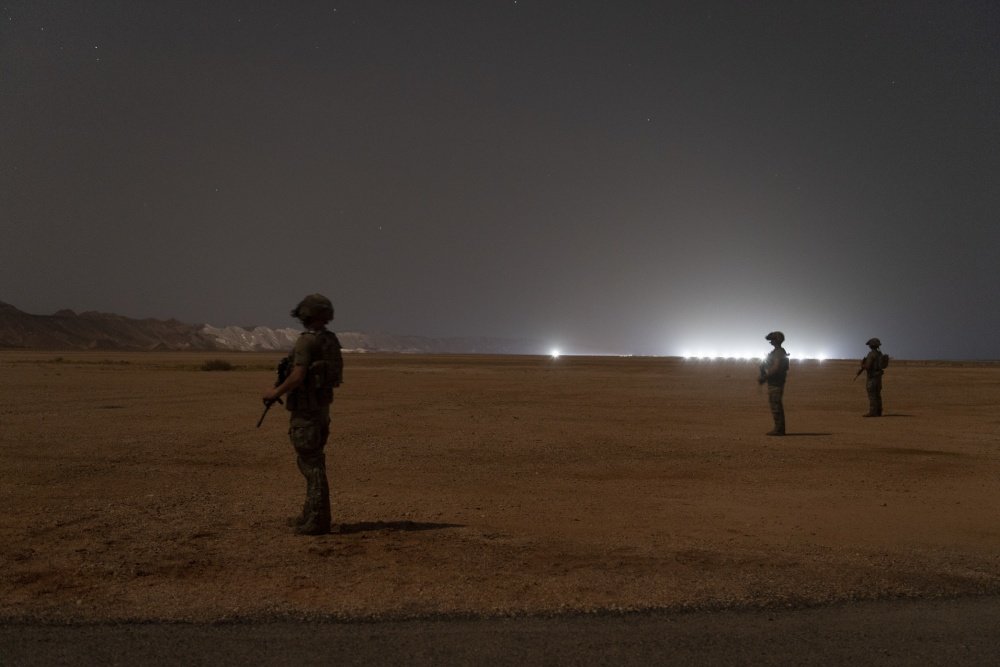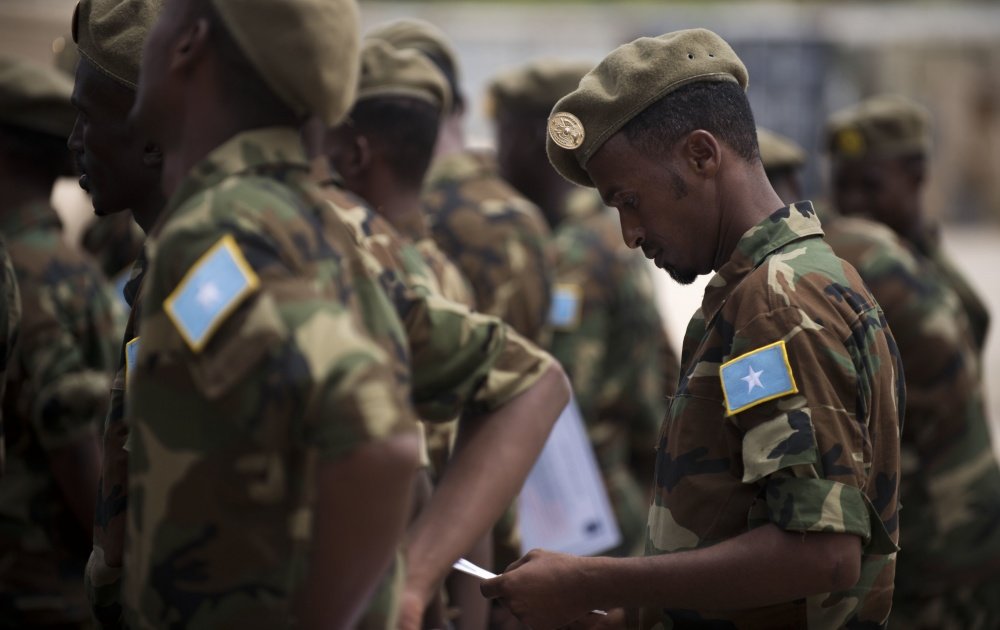Terrorist Violence Sweeps Somalia Following US Military Departure and Airstrike Pause

Interim Juba Administration forces seen driving into Kismayu, Somalia, while celebrating rescuing hostages. The women were kidnapped by al-Shabab fighters on May 30, 2014, but were rescued later in the day in a daring operation involving around 200 Interim Juba Administration forces aided by AMISOM Kenya Defence Forces air surveillance capability. AMISOM Public Information Services / Ramadan Mohamed via Wikimedia Commons.
With US forces gone and American airstrikes on pause, a wave of terrorist violence has swept Somalia, killing dozens of civilians.
A contingent of some 700 US military personnel departed Somalia in the final days of the Trump administration. Despite the drawdown, from Jan. 1 to 19 — the final 19 days of the Trump presidency — US Africa Command carried out seven airstrikes in Somalia against al-Shabab, an al Qaeda-affiliated Islamist insurgency.
Since President Joe Biden took office on Jan. 20, US forces have not conducted any airstrikes in Somalia, part of a broader tightening of restrictions on counterterrorism strikes by the new administration meant to limit civilian casualties. Combined with the ground-level drawdown, the pause in airstrikes has given al-Shabab time to regroup, some terrorism experts and Somali officials warn.
“Of course, the operations should be conducted with the utmost care and should protect civilians,” Samira Gaid, who served as a senior security adviser to former Somali Prime Minister Hassan Ali Khaire, told Voice of America. “But the reality is, the group [al-Shabab] needs to be on the defensive and should not have freedom of movement and operations, and that’s what the airstrikes helped with.”
The New York Times first reported on the Biden administration’s airstrike restrictions. For its part, US Africa Command is investigating reports of civilian casualties from airstrikes on Jan. 1 and 19, both of which occurred under the Trump administration’s watch.
At least 20 people were killed and 30 wounded by a suicide car bomb just outside a restaurant near the port in Somalia’s capital Mogadishu late on Friday, an emergency services official said. https://t.co/TOHuVaqd37 pic.twitter.com/R35RSKePWc
— Reuters Africa (@ReutersAfrica) March 6, 2021
On Jan. 19 — just two days after the Pentagon announced all US forces had left Somalia — a land mine explosion killed four people in the capital city of Mogadishu. Al-Shabab claimed responsibility. On Jan. 31, nine people died after al-Shabab militants stormed a hotel in Mogadishu; among the dead were four of the attackers. A Feb. 13 suicide car bombing at a security checkpoint outside Somalia’s parliament in Mogadishu killed two civilians.
And on Friday at least 20 people died after a suicide car bomb detonated outside the Luul Yemeni restaurant near Mogadishu’s port — a location reportedly popular with government officials and security personnel. That same day, al-Shabab militants reportedly stormed a prison in Bosaso, Somalia, killing at least eight people. The terrorist group claimed it released 400 prisoners in the attack.
While some Somali officials have praised the Biden administration’s concern for civilians, they’ve also expressed concerns that the de facto moratorium on American airstrikes has helped al-Shabab reconstitute its forces, and may lead to more brazen attacks in the future.
“The Somali National Army fully supports U.S. Africa Command’s efforts to degrade al-Shabaab through kinetic air strikes,” Somali Chief of Defense Forces Brig. Gen. Odawa Yusuf Raage said during a recent meeting with US officials, according to a US Africa Command release. “These strikes are a key part in our fight against an enemy that has shown no hesitation in terrorizing innocent Somali citizens through repression, extortion, and murder. U.S. Africa Command airstrikes and assistance help make Somalia safer and more secure.”

Al-Shabab, or the “Youth,” comprises about 10,000 militants across Somalia and Kenya. A combined African Union military force has diminished the group’s power in Somalia, yet the extremist militancy still carries out frequent terrorist attacks in East Africa, particularly against civilian targets, and has set its sights on attacking the US homeland, as well.
Thus, some defense experts warn that if al-Shabab gains a more stable foothold in Somalia, the threat to the US homeland will correspondingly increase.
“The terrorist threat in East Africa is not degraded,” the Pentagon warned in a November report. “Al-Shabab retains freedom of movement in many parts of southern Somalia and has demonstrated an ability and intent to attack outside of the country, including targeting U.S. interests.”

Coffee or Die Magazine previously reported that in 2016 al-Shabab sent one of its militants on a thwarted mission to hijack and crash a commercial aircraft within the US. After attending two years of flight training, the would-be hijacker — a Kenyan national named Cholo Abdi Abdullah — was arrested in the Philippines in 2019. The US Justice Department charged Abdullah with multiple terrorism counts in December, including “conspiring to hijack aircraft in order to conduct a 9/11-style attack in the United States.”
“This chilling callback to the horrific attacks of September 11, 2001, is a stark reminder that terrorist groups like al Shabaab remain committed to killing U.S. citizens and attacking the United States,” acting Manhattan US Attorney Audrey Strauss said in a release at the time.
Prior to January, US military personnel were deployed to Somalia to advise and assist Somali troops in combat against al-Shabab, as well as to support those operations with precision airstrikes. Since leaving Somalia, most of those US forces have repositioned in nearby Kenya and Djibouti.
“Applying continued pressure on al-Shabaab is important for the security of Somalia, East Africa, and America,” US Army Gen. Stephen Townsend, commander of US Africa Command, said in a March 5 release.

BRCC and Bad Moon Print Press team up for an exclusive, limited-edition T-shirt design!
BRCC partners with Team Room Design for an exclusive T-shirt release!
Thirty Seconds Out has partnered with BRCC for an exclusive shirt design invoking the God of Winter.
Lucas O'Hara of Grizzly Forge has teamed up with BRCC for a badass, exclusive Shirt Club T-shirt design featuring his most popular knife and tiomahawk.
Coffee or Die sits down with one of the graphic designers behind Black Rifle Coffee's signature look and vibe.
Biden will award the Medal of Honor to a Vietnam War Army helicopter pilot who risked his life to save a reconnaissance team from almost certain death.
Ever wonder how much Jack Mandaville would f*ck sh*t up if he went back in time? The American Revolution didn't even see him coming.
A nearly 200-year-old West Point time capsule that at first appeared to yield little more than dust contains hidden treasure, the US Military Academy said.












